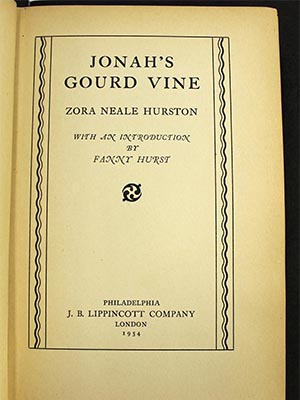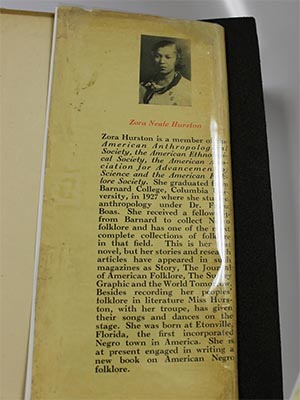Zora Neale Hurston’s “Jonah’s Gourd Vine”
September 1, 2016
Description by Matthew Chernick, Masters Student in Comparative Humanities and Archives & Special Collections assistant.
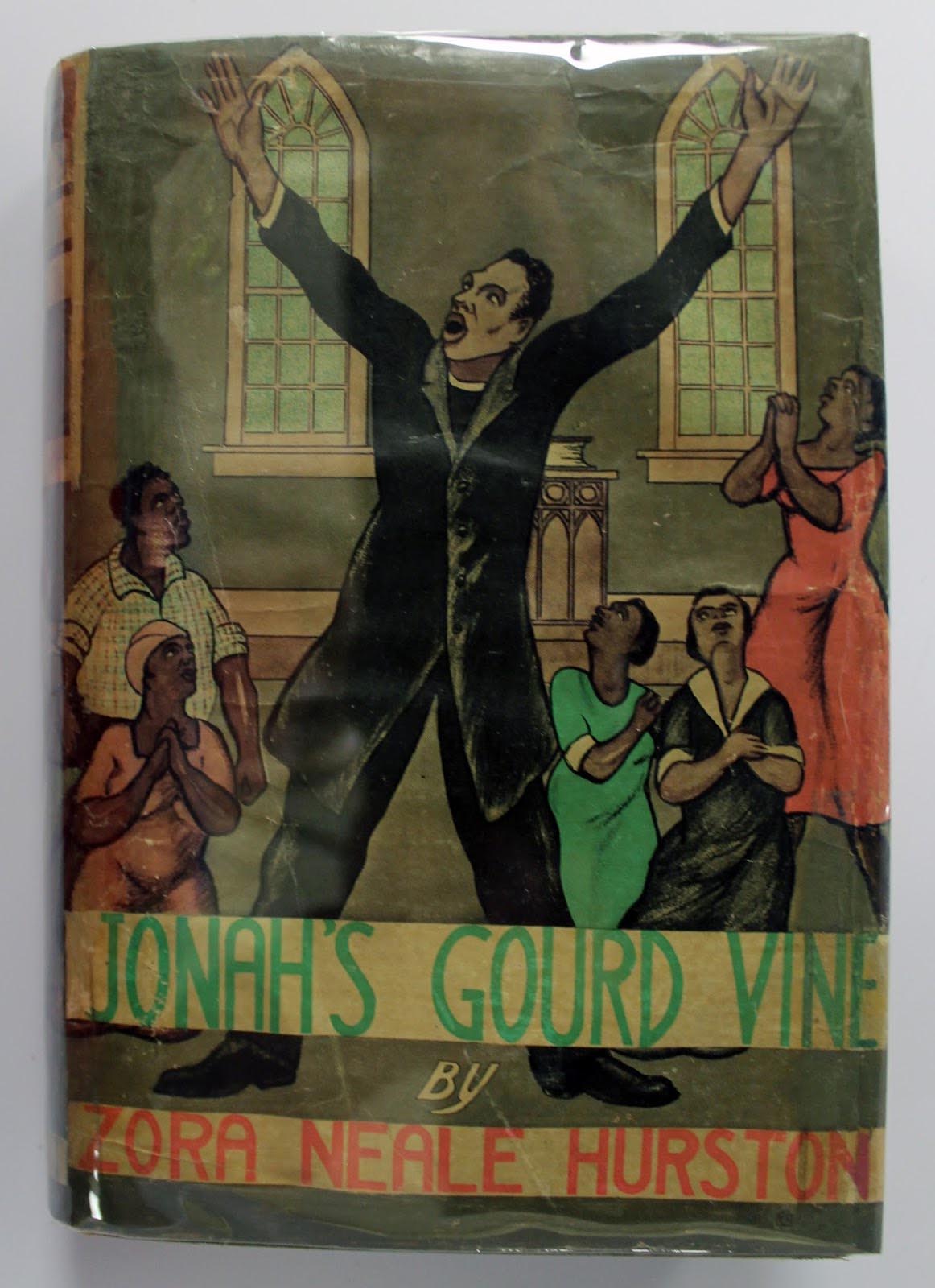 University Archives & Special Collections proudly announces the recent acquisition of a first edition of Zora Neale Hurston’s debut novel “Jonah’s Gourd Vine” (1934). Hurston (January 7, 1891 – January 28, 1960) was an American author, folklorist and anthropologist whose work is closely associated with the Harlem Renaissance. She published several pieces on black folklore and culture in the American South and her work includes four novels and over 50 plays, short stories and essays. Her 1937 novel “Their Eyes Were Watching God” is widely considered to be a vastly influential work of both African-American and women’s literature.[1] Hurston inscribed this particular copy of “Jonah’s Gourd Vine” to Kate Thompson, daughter of anthropologist Harold Thompson, with the words “To/ Kate Thompson/ A gold throne-angel/ with shiny wings/ Zora Neale Hurston.”[2] This book, along with its restored, rare dust jacket was procured through the generous support of the Ann and Abe Effron Fund.
University Archives & Special Collections proudly announces the recent acquisition of a first edition of Zora Neale Hurston’s debut novel “Jonah’s Gourd Vine” (1934). Hurston (January 7, 1891 – January 28, 1960) was an American author, folklorist and anthropologist whose work is closely associated with the Harlem Renaissance. She published several pieces on black folklore and culture in the American South and her work includes four novels and over 50 plays, short stories and essays. Her 1937 novel “Their Eyes Were Watching God” is widely considered to be a vastly influential work of both African-American and women’s literature.[1] Hurston inscribed this particular copy of “Jonah’s Gourd Vine” to Kate Thompson, daughter of anthropologist Harold Thompson, with the words “To/ Kate Thompson/ A gold throne-angel/ with shiny wings/ Zora Neale Hurston.”[2] This book, along with its restored, rare dust jacket was procured through the generous support of the Ann and Abe Effron Fund.
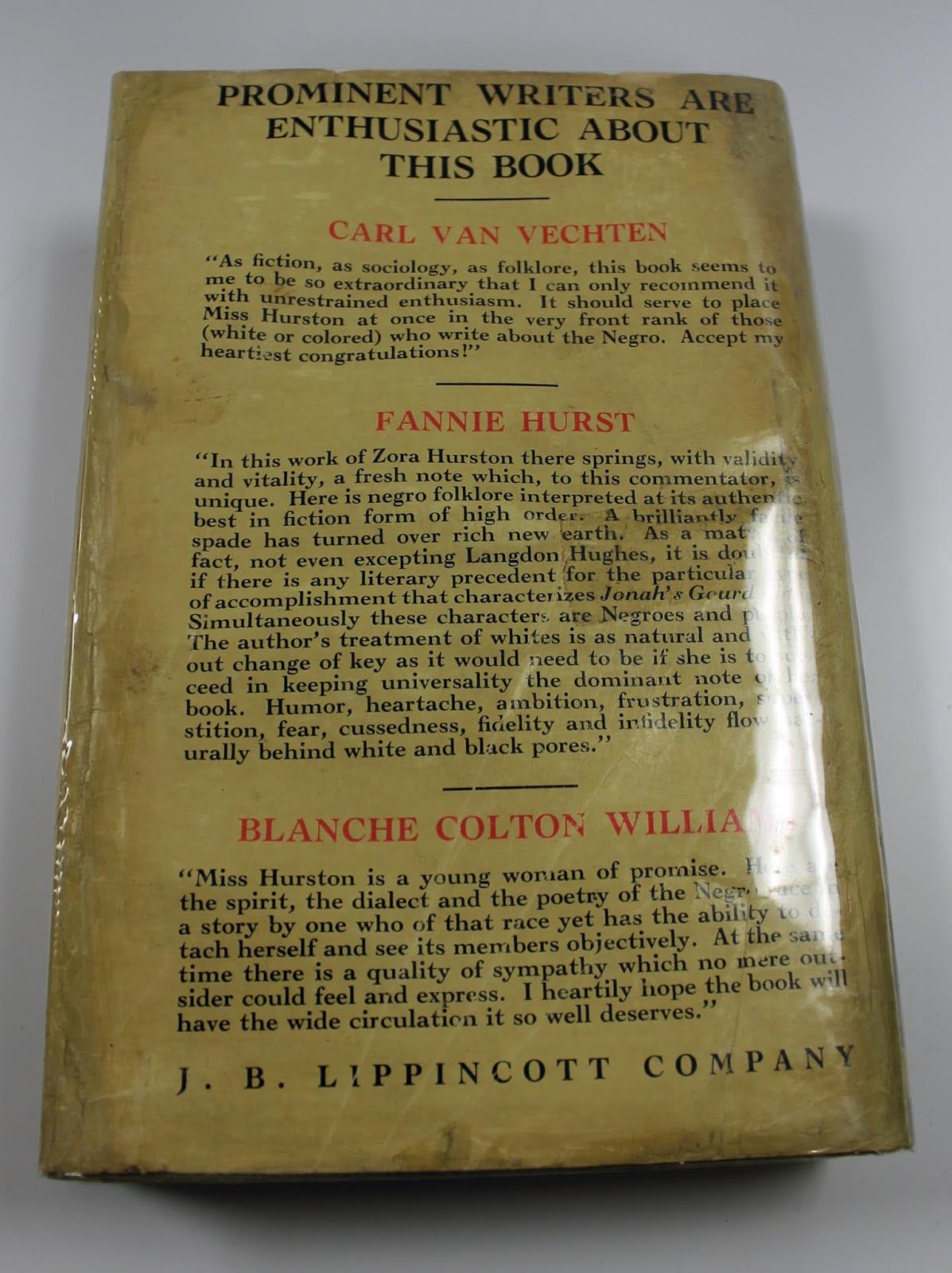 “Jonah’s Gourd Vine” is a semi-autobiographical narrative of a philandering African-American preacher named John Pearson as his family travels from Alabama to Eatonville, Florida (Hurston’s hometown).[3] Hurston wove into the text of the novel elements of her parent’s life and marriage, as well as her own education and anthropological research. The book’s title is derived from a passage from the Book of Jonah, which describes a vine being eaten away by a serpent.
“Jonah’s Gourd Vine” is a semi-autobiographical narrative of a philandering African-American preacher named John Pearson as his family travels from Alabama to Eatonville, Florida (Hurston’s hometown).[3] Hurston wove into the text of the novel elements of her parent’s life and marriage, as well as her own education and anthropological research. The book’s title is derived from a passage from the Book of Jonah, which describes a vine being eaten away by a serpent.
This first edition of “Jonah’s Gourd Vine” is a beautiful artifact of the art, literature and society of the Harlem Renaissance. Its stunning, pictorial dust jacket vividly portrays detailed scenes from the novel. The introduction is by Fannie Hurst, a noted Jewish-American author and activist of the early 20th century, and writer, photographer and fellow cultural luminary Carl Van Vechten is quoted on the dust jacket. Both Hurst and Van Vechten had close ties to many members of the Harlem Renaissance.
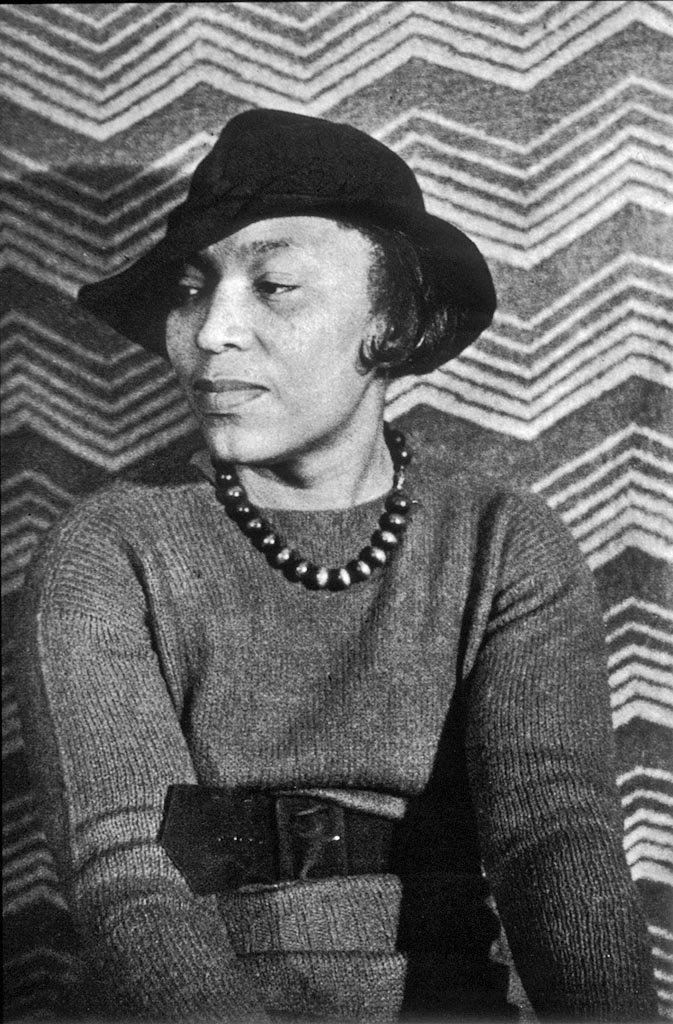 Hurst served as Hurston’s patron, while Hurston was Hurst’s trusted confidant, also sometimes working as Hurst’s chauffeur, maid and secretary. Though the relationship between the two was complex and often fraught with racial and socioeconomic tensions, Hurst, along with Van Vechten, was strongly supportive of the extremely intelligent and talented Hurston. Hurst’s and Van Vechten’s patronage included ensuring Hurston’s admission into Barnard College, where she finished the degree she had begun at Howard University.[4] Hurston went on to conduct graduate work in Anthropology at Columbia University.
Hurst served as Hurston’s patron, while Hurston was Hurst’s trusted confidant, also sometimes working as Hurst’s chauffeur, maid and secretary. Though the relationship between the two was complex and often fraught with racial and socioeconomic tensions, Hurst, along with Van Vechten, was strongly supportive of the extremely intelligent and talented Hurston. Hurst’s and Van Vechten’s patronage included ensuring Hurston’s admission into Barnard College, where she finished the degree she had begun at Howard University.[4] Hurston went on to conduct graduate work in Anthropology at Columbia University.
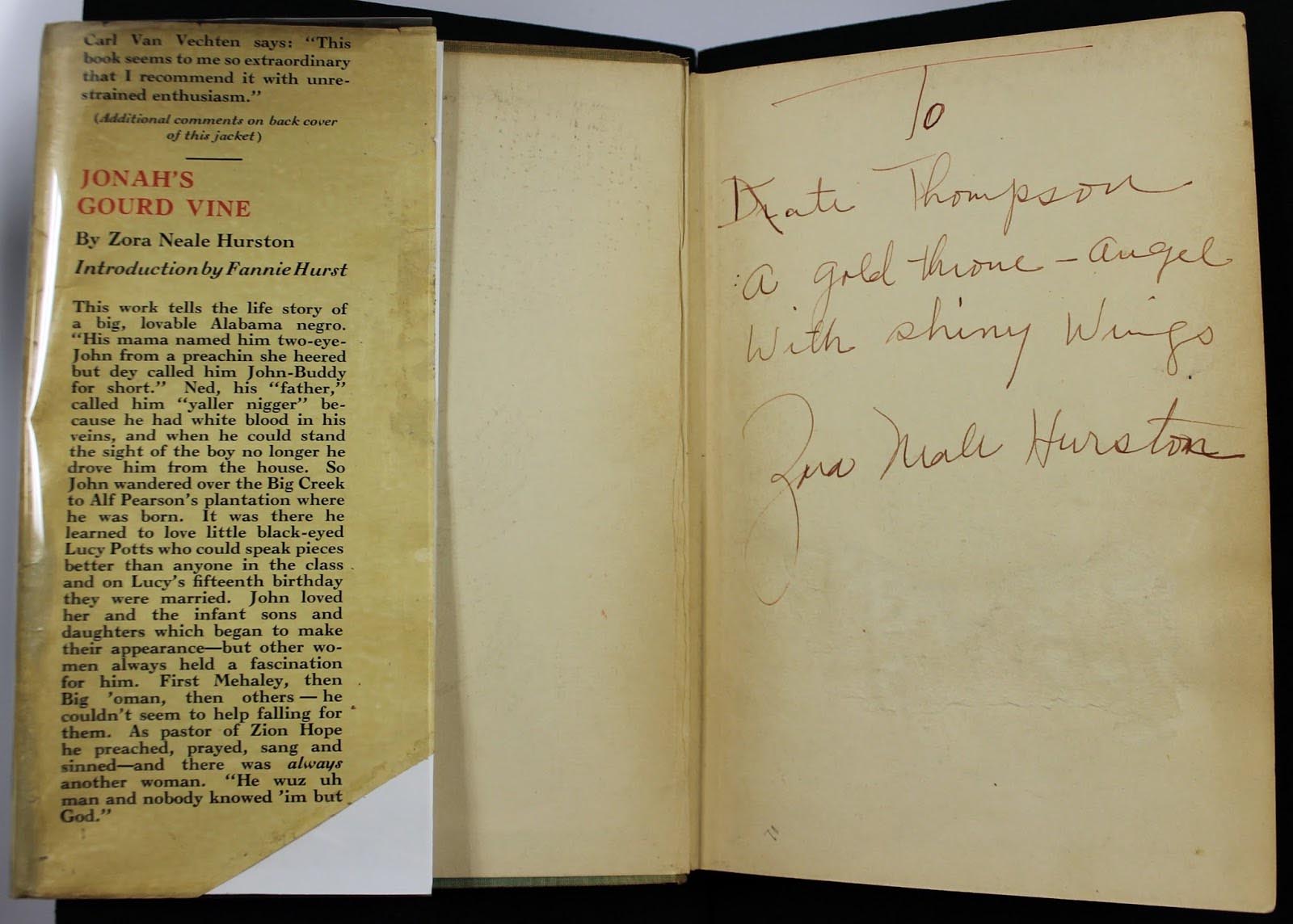 On its own, this novel is an excellent addition to Brandeis University’s Special Collections, but its research value is greatly enhanced due to its multiple connections to other holdings in the department. Special Collections is home to a large collection of Fannie Hurst’s papers, and included among these materials is a letter from Hurst to Hurston. In addition, Special Collections’ Carl Van Vechten photographs collection includes images of Hurst, Hurston and a number of other figures of the Harlem Renaissance. Lastly, Special Collections is home to other literary works of the Harlem Renaissance, including several works by Langston Hughes, with whom Hurston collaborated on the 1930 play Mule Bone: A Comedy of Negro Life.
On its own, this novel is an excellent addition to Brandeis University’s Special Collections, but its research value is greatly enhanced due to its multiple connections to other holdings in the department. Special Collections is home to a large collection of Fannie Hurst’s papers, and included among these materials is a letter from Hurst to Hurston. In addition, Special Collections’ Carl Van Vechten photographs collection includes images of Hurst, Hurston and a number of other figures of the Harlem Renaissance. Lastly, Special Collections is home to other literary works of the Harlem Renaissance, including several works by Langston Hughes, with whom Hurston collaborated on the 1930 play Mule Bone: A Comedy of Negro Life.
Notes
- Wikipedia: Zora Neale Hurston.
- Bookseller’s note.
- Smithsonian Anacostia Community Museum. "Jonah’s Gourd Vine” (novel, 1934) (digital exhibit).
- Jewish Women’s Archive Encyclopedia: “Fannie Hurst.”
